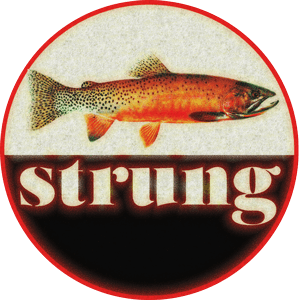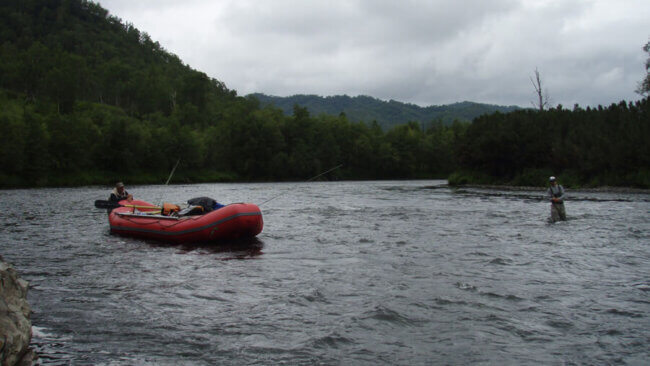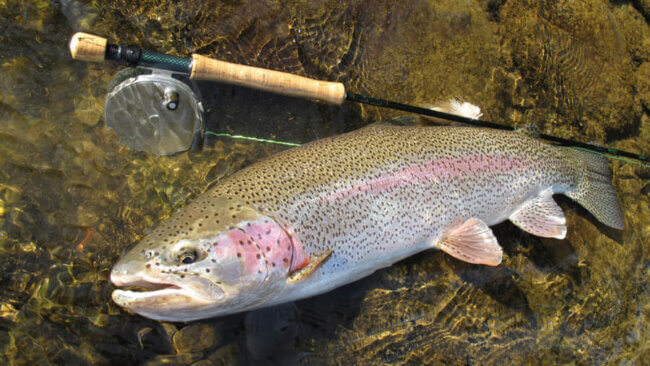(Continues from Part One)
“Every day a new campsite and a new section of water,” explained Wild Salmon Center President Guido Rahr to our group of celebrity clients. This trip we had the largest landowner and the owner of a national news network in the U.S., and the past president of the World Bank among our guests. Guido went on to explain how this operation was not only a fly fisherman’s dream, but also a conservation program funded by the anglers who purchased these trips. He explained how the guides were taking scale samples and recording every fish caught, using the most modern methods to reduce harm to these wild rainbows. The data were then sent back to the U.S. to help figure out how to produce a healthy, natural population of fish in our own rivers, damaged by numerous human activities. He was presenting slides on a screen, and showing all the Wild Salmon Center’s operations throughout Russia. I exited the cook house and stood outside next to our young cook’s helper Vladimir, joining him for a cigarette. I tried to explain to him what was going on in there. The meeting didn’t end, and we talked for a long while. When I inquired about his pencil-thin legs, he lifted his shirt to reveal a depression in his belly, under the right ribcage. It seemed to go all the way back to his spine and was big enough to fit a fist into. His chest and belly were a mess of twisted skin. He’d spent years in a wheelchair, he told me.
“My friend,” he explained. “He shoot me with Kalashnikov with barrel right here.” He used his index finger as a barrel and held it close to his body.
“Ve war young, and drink much vodka.” A solemn mood came over him. A bit of anger flashed in his eye, and then the expression on his face changed. A look of relief swept over his face.
“God save me. I have reason to live now. If God not want me to, I am dead.”
The next morning I awoke early, perspiring little droplets of vodka. The owner of CNN was up, and I asked him if he needed anything. With a large hand he waved me off, holding a satellite phone to his ear with the other mitt. His assistant informed me later that he made a habit of calling his ex-wife, and good friend, almost every morning. I headed over to the cook tent to make sure the chefs were up and making coffee. Then I hiked down to the river in my waders with my Spey rod for a morning fish.
The river had disappeared in fog. Standing waist deep and listening to the rolling and gurgling of the water felt like being in some kind of sensory deprivation chamber. Giant flat boulders poked out beneath the fog, giving the whole scene a very ancient feel. My casting was in perfect form and taking up almost all my running line. I was fishing into my backing when a monster took the sunken fly and tore up the surface of the water. The line went slack, and I decided not to fish such a long line, because you have to get lucky with the hook-set. Casting again, I felt another take. I stuck the hook and landed one this time, a 22-inch, acrobatic fish.
Later, after a long day on the river, everyone was exhausted. My boat had caught the most fish four days in a row now, and the friendly advice and communication from my Russian comrades had all but stopped. I could tell something was wrong, but when I asked Dima One, he denied there was a problem but wouldn’t look me in the eye. I wondered if my boat’s consistent success was making him look bad, but couldn’t get more than a few words out of him. The clients had dinner, and then it was our turn. The Dimas were laughing and chatting expressively in Russian, but paid no attention to me.
“Pass me the salt, please,” I asked, pointing at the shaker. They fell silent and stared at their plates while Dima Two handed me the salt. I added a small amount to my borscht, and as I put it back on the table it fell over, spilling some granules on the table.
“Blyad!” screamed Dima One, jumping to his feet, enraged. “What is your problem?” he yells at me. His face turned red, and I thought steam would start blowing from his ears.
“I’m sorry,” I replied, trying not to sound frightened. “What is the problem?”
“In Russia you don’t spill the salt! Very bad things happen now. You have gotten us all killed, Alyosha!” he shouted, waving his arms. “I will never fly in a chopper again!”
“I’m really sorry,” I said. “I swear, I had no idea,” I added, not knowing whether my leg was being pulled. I threw the spilled pinch of salt over my shoulder, attempting to right the situation before I was thrown in the gulag for breaking some age-old Russian law. Dima One charged out of the cook tent, leaving his meal half eaten. The other Dima didn’t react in the slightest, and continued eating, eyes on his soup. Two hours later, I knocked on the door of the caretaker’s cabin. I knew the Dimas liked to hang out in there, secretly drinking vodka and listening to the barely audible radio. The door opened and there was Dima One, staring at me as if he wanted my head. I felt he was ready, at any moment, to pounce at me from his seat, prison shank in hand. I made a point of sitting right next to him. Reluctantly, he poured me a shot of vodka and handed me a slice of meat.
“Look,” I told him. “I am not sure what I have done, but I can see you are very upset, and for that I am sorry. I have traveled many places and learned that not everyone does things the same way. To overcome this obstacle, we must have excellent communication. I am a guest in your country, and I don’t necessarily know all the rules and customs, so you must help me with this.”
Within the hour we had finished most of the bottle of vodka, and figured out that the real issue was that my boat was not sharing the good fishing spots fairly. But Dima One had been too proud to point this out. Of course I didn’t know which spots were traditionally considered the best, since it was my first time on the river, and this he finally understood and agreed. Before I left the cabin, he embraced me in a bear hug and called me his brother for life, and told me that we would take care of each other. From that night forward, we were as tight as could be.
It was our fifth trip on the river, and some old clients of mine had unexpectedly shown up. Dan, his brother Ryan, and their brother-in-law Jamie, all of whom I’d guided in British Columbia, had come with their father John and his friends, Stan and Steven. The first day, Steven was with me. He had never fly fished before but was a pretty confident man, and was soon into a big fish. As I coached him through the fight, he did everything he was told and remembered the advice I had given him during our drift in the raft. He landed the fish, a 30-inch rainbow and the biggest of the day. I made sure to carefully take a scale sample and a fin clipping and immortalize the fish with the waterproof notebook and pencil I kept in my jacket. The other, more seasoned anglers weren’t pleased with his catch, and that was the last time Steven accompanied me in the raft.
Drifting with Dan and Jamie and Ryan was enjoyable as always, and we reminisced about good days on the river. John, however, also turned out to be a lot of fun, as our personalities meshed well and we experienced all sorts of adventures together in the raft.
“That looks like a good spot,” John said, eyes aiming downstream toward a flat section below us. The river was wide here, but coal-black canyon walls rose high above us, making us feel that we were floating through some ancient giant’s footprint. The fog hung heavy in clumps, and the black scree walls screamed Jurassic Park. This place was exhilarating and terrifying at the same time. The beauty of this place was the kind you would find in an ancient cathedral in Vlad the Impaler’s kingdom in the mountains of Transylvania. I brought the raft to shore with the powerful Russian oars, and the guys couldn’t wait to get out and start fishing.
I made sure the raft was secure, then poured myself a coffee. I watched John hook into a fish at the top of the pool that took him downstream, running. It jumped, looking like a baby porpoise. I dropped my coffee cup and broke toward John. The fish ran and ran and ran some more. John held his ground at the end of the gravel bar and steered the fish toward the bank, the rod anchored to his inside hip and pulling to one side. The fish’s momentum was eventually broken and it succumbed to the pressure. John wound his reel and I went out and grabbed the fish.
“A kundzha,” I said, holding the fish to show him.
“What a monster!” he said.
The kundzha (aka Siberian white-spotted char) is an anadromous char, growing to 20 pounds. They return upstream like steelhead, and travel very far up from the sea. They are silver with black, sometimes navy blue backs, and have bars on their sides. They color greenish during their time in fresh water, but fight well, sometimes dogging like bull trout and at other times running like salmon. We got a photo, and John was back in the water swinging for another.
I took a walk toward the scree slopes and saw a pile of something on the ground. It looked like human remains. I was suddenly terrified. I walked up to the gory heap of flesh to get a closer look. It was definitely a fresh kill from today or yesterday. Organs, intestines, and blood were all I could see. I grabbed a piece of driftwood from the ground to use as a tool. Hidden underneath were fur and claws. This bear had been turned inside out. I imagined what animal could do such a thing to a giant grizzly, and suddenly felt as though I was being watched. My head snapped up, and I scanned the scene carefully to see if I could spot anything.
Fear engulfed my heart. I thought about meeting the animal that was responsible for this, and decided I did not want that. I headed back to the raft swiftly, without running or causing a scene, and told the boys that we needed to leave now. When bears are around, night and day, it keeps you on your toes, and the guys were in the raft quickly. We were drifting downstream. I scanned the bank and swore I saw something behind some bushes that seemed to intentionally move out of sight. That night the wolves howled, and I was sleepless, listening to all the eerie noises of the Russian wilderness.
Stories of Russian Bigfoot relayed in broken English from Dima One replayed in my mind. I pulled the sleeping bag up to my cheek, but my eyes were wide open. Every broken twig, every sound outside my cabin painted the picture of a half-bear, half-ape creature lumbering through the brush in search of its next meal. I knew grizzly bears do eat each other from time to time, and I wanted to attribute the day’s discovery to one of these occurrences. But the way it was torn apart and turned inside out like that! I tried to imagine how a bear could accomplish this. The sounds outside intensified as bear after bear walked the bank past my cabin, leaping into the river after salmon in the light of the waxing moon. Every few seconds I could hear a small silver body or two splash, and sometimes the grunt of a bear. If there were an animal on this planet that survived on bears, it would be here. I thought back to what Dima One had said earlier, when discussing the subject.
“I have seen it once,” he said, raising a finger. “The animal does not eat fish or berries. It only eats bears.”
Bio: Alexei J.D. Boyanowsky was born and raised in Vancouver, British Columbia. He started his career on the river nestled inside the bib of his parents’ waders as they fished the rivers of British Columbia for winter steelhead. In his mid teens he had published his first magazine article and was a whitewater rafting guide running rivers in BC, Alberta, The Yukon and Alaska. Alexei became head-guide at a remote fishing lodge near Vancouver, BC and guided there throughout his late teens and twenties. He later moved on to guide and run fly-fishing operations on Vancouver Island and in Kamchatka, Eastern Russia. Following that he worked as a sport fishing captain dividing seasons between the Bahamas and Turks and Caicos Islands in winter and spring, and the West Coast of British Columbia and Southeast Alaska in the summer. At 33 Alexei is a registered and licensed guide in Nova Scotia, Canada where he resides and fishes the Atlantic provinces for salmon, trout, striped bass and sturgeon.
 SUBSCRIBE TO STRUNG MAGAZINE
SUBSCRIBE TO STRUNG MAGAZINE
https://pnt.tta.mybluehost.me/surviving-kamchatka-part-one/
https://pnt.tta.mybluehost.me/fly-fishing-gear-spring-gear-roundup/
https://pnt.tta.mybluehost.me/keystone-chrome-steelheading-pennsylvania/




